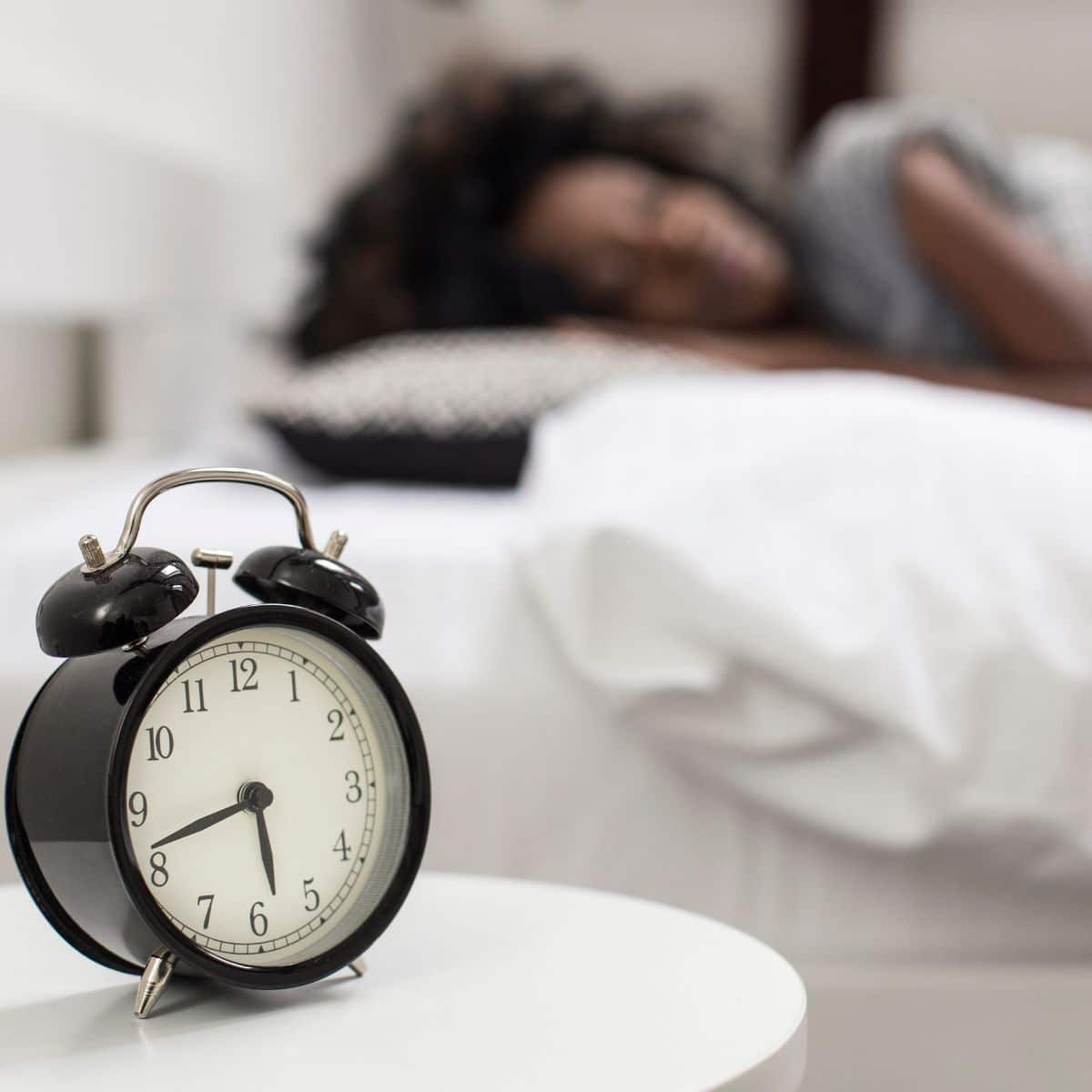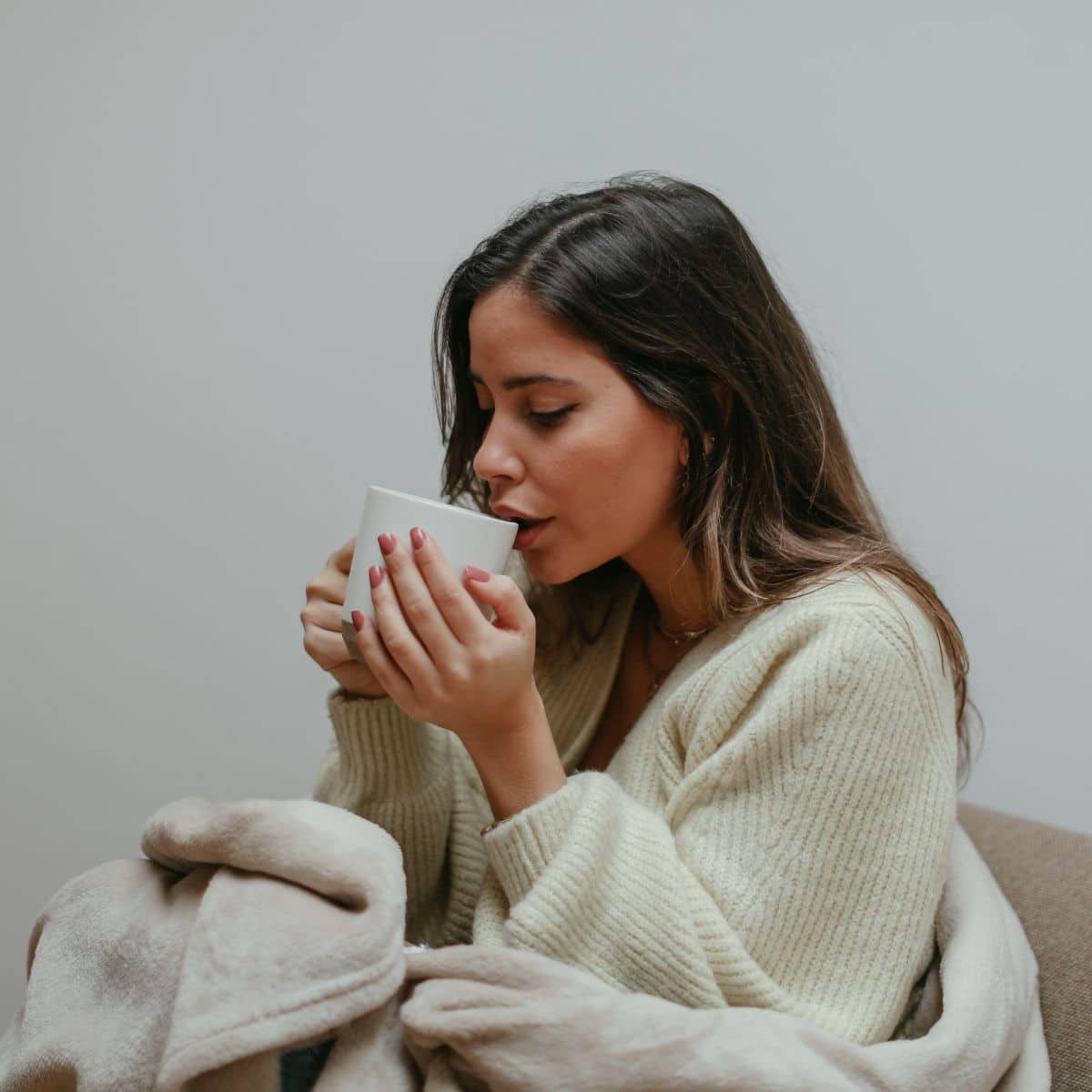Can Plant-Based Nutrition Help You Sleep Better?
Poor sleep (either insufficient duration of sleep or low-quality sleep) is associated with a weakened immune system, Alzheimer’s, disrupted blood sugar levels, cardiovascular disease, psychiatric conditions, and more.[1] It’s also frighteningly common. The majority of adults in developed nations fail to meet the recommended amount of nightly sleep, and the World Health Organization (WHO) has even declared a sleep loss epidemic throughout industrialized countries.
In a study exploring the associations between sleep duration and mortality in Japanese men and women, researchers found a U-shaped relationship between sleep and mortality, suggesting that increased mortality is associated with both short and long sleep.[2] Seven hours per night is the sweet spot according to this study. The consensus recommendation from the American Academy of Sleep Medicine and Sleep Research Society is similar: “Adults should sleep 7 or more hours per night on a regular basis to promote optimal health… sleeping more than 9 hours per night on a regular basis may be appropriate for young adults, individuals recovering from sleep debt, and individuals with illnesses.”[3]
One way to measure the severity of the poor-sleep crisis is to look at the market for sleeping aids: sleep apnea devices, medications, etc. According to one research report, the global market for sleeping aids in 2021 was valued at 64.08 billion US dollars.[4] They forecast that the market will nearly double by 2030, reaching almost 120 billion US dollars. For comparison, that forecasted amount is more than the combined global market size in 2022 for the production and distribution of movies and music (110.7 billion USD).[5]
How can we improve this situation? And is there a role for nutrition?

Timing Matters
The importance of having a regular sleep schedule will make intuitive sense to parents or anyone who has seen what happens when children get off of a regular sleep schedule. But kids aren’t the only ones who can benefit from regularity: cognitive behavioral therapy for insomnia (CBT-I)—perhaps the most effective behavioral method for improving sleep—prescribes that patients establish regular bedtime and wake-up times, even on weekends.[6]. In a 2018 article published in Scientific Reports, researchers emphasized the importance of sleep regularity for decreasing the risk of cardiovascular disease, obesity, hypertension, and more.[7]
The timing of our eating also makes a difference. In a 2015 study, researchers assessed eating patterns in adults; their findings contained a lot of variability: “Most subjects ate frequently and erratically throughout wakeful hours [emphasis added],” with a bias toward eating later in the day and differences between weekdays and weekends.[8] They then took overweight individuals with a greater-than-14-hour feeding window and instructed them to reduce to 10–11 hours/day for 16 weeks. This relatively modest change was not combined with any specific nutrition recommendations or caloric restriction, yet the subjects enjoyed weight loss, increased energy, and improved sleep.
The National Sleep Foundation recommends not eating within 2–3 hours of bedtime, and you might want to extend that even more when it comes to foods heavy in proteins that promote the synthesis of dopamine, “a wake-promoting neurotransmitter.”[9]

Caffeine and Sugar
You might also want to avoid foods and beverages that hinder high-quality sleep, including caffeinated substances, chocolate, and sugar-sweetened beverages (SSBs).
And this advice applies not only immediately before bedtime. It takes several hours for caffeine to leave your system, as researchers found in a study published in 2013.[10] Whether taken zero, three, or six hours before bedtime, caffeine ingestion had “significant effects on sleep disturbance relative to placebo.” A word of caution about this study, however: The caffeine dose was quite large (400 mg), equivalent to more than two grande-size Starbucks iced caffé mochas.[11] That isn’t to say smaller doses of caffeine won’t also disturb your sleep, only that the degree of disturbance might be less than what the researchers observed.
So, does that mean you should avoid all caffeine-containing beverages? Not necessarily. That’s an assessment you’ll have to make based on your current level of sleep quality and the balance of health benefits. Green tea, for instance, provides many health benefits, certainly more than a Starbucks caffé mocha. And you’d have to drink more than 14 eight-ounce cups of brewed green tea to reach the 400 mg of caffeine in the study above![12]
It’s also worth noting that what we ingest can affect our sleep in ways we might not immediately notice. In a study of Iranian adults, researchers found that sleep quality but not duration was associated with intake of SSBs, “especially in younger and non-obese individuals.”[13] In other words, you might not have difficulty falling asleep—and you might not even feel any different after only one or two nights—but eventually, you’ll likely feel the cumulative effects of being less well-rested.

Remember the Whole
Besides avoiding the obvious foods and beverages, what does the research say about broader dietary habits and sleep quality? According to a recent study, “whole diets rich in fruits, vegetables, legumes… have been shown to predict favorable sleep outcomes.”[14] This idea is supported by a systematic review that included 29 studies in which researchers found the consumption of healthy foods associated with higher-quality sleep.[15] While there wasn’t a consistent definition of what constitutes a “healthy diet” in the reviewed studies, certain patterns emerged, “including high intake of plant-derived foods… whole-grains and legumes,” often as part of a Mediterranean-style diet. Conversely, the consumption of processed foods was associated with lower sleep quality.
The contrast between natural plant-based foods and processed junk food is consistent with the researchers’ remarks about carbohydrates: “rather than mere quantity, the reviewed studies pointed that the type of carbohydrates may be a more important target…”
So, context matters—what’s new?
Non-nutritional factors affecting sleep include exercise, sleep hygiene, and stress. And these are interrelated. For instance, there is a cyclic relationship between sleep and exercise: the better you sleep, the higher your energy and fitness levels will become, and the more you exercise, the better your sleep will become.[6] Stress is similar: sleep-deprived individuals are more likely to struggle with stressful situations, and stress contributes to poor sleep.
Here are some general tips for improving your sleep hygiene from the 2017 bestseller Why We Sleep:[16]
- Develop a sleep routine that includes a regular bedtime and wake-up time; avoid sleeping in on weekends.
- Exercise regularly, but not within 2–3 hours of your bedtime.
- Avoid caffeine, nicotine, and alcohol.
- Avoid large meals and beverages late at night.
- If possible, avoid medicines that disrupt sleep patterns.
- Try not to take naps after 3 pm.
- Build relaxation into your bedtime routine.
- Take a hot bath before bed.
- Keep your bedroom dark and cool. Remove anything that might distract you from sleeping, including TVs and cell phones.
- Try to get sunlight exposure every day, especially in the mornings.
- Don’t lie awake in bed. If you feel yourself becoming anxious about not being able to sleep, get up and do a relaxing activity until you feel sleepy enough to return to bed.

Soporific Foods and Beverages?
So you’ve eliminated the things that disrupt sleep, you’re eating a healthy plant-based diet, and you’ve adopted better habits by following the tips above. What if you still can’t sleep?
Several specific foods and drinks have been associated with improved sleep (in the case of honey, the improvement may owe more to the alleviation of upper respiratory tract infection symptoms rather than the direct effect of honey on sleep):
- Lettuce[17][18]
- Chamomile tea[19]
- Honey[20][21]
- Tart cherries[9][22][23]
- Passionflower tea[24]
- Kiwifruit[22][25]
However, I would warn against seeking a quick fix from any of these individual foods or beverages (or the nutrients they contain) in isolation. If you want to try integrating them into your sleep routine and find that they help you sleep better—fantastic! But there are no shortcuts that will overcome unhealthy sleep behaviors, and the total effect of these foods and drinks on our health is, as usual, going to be most profound as part of a broad, whole food, plant-based diet.
References
- Walker M. Chapter 1: To sleep . . . Why we sleep: unlocking the power of sleep and dreams (2017). Scribner.
- Ikehara S, Iso H, Date C, Kikuchi S, Watanabe Y, Wada Y, Inaba Y, Tamakoshi A; JACC Study Group. Association of sleep duration with mortality from cardiovascular disease and other causes for Japanese men and women: the JACC study. Sleep. 2009 Mar;32(3):295-301. doi:10.1093/sleep/32.3.295
- Watson NF, Badr MS, Belenky G, et al. Recommended amount of sleep for a healthy adult: a joint consensus statement of the American Academy of Sleep Medicine and Sleep Research Society. Sleep. 2015;38(6):843–844. doi:10.5665/sleep.4716
- Polaris Market Research. Global size of sleeping aids market anticipated to reach USD 118.3 billion by 2030: Polaris Market Research. Medgadget.com. September 20, 2022. Accessed December 7, 2022. https://www.medgadget.com/2022/09/global-size-of-sleeping-aids-market-anticipated-to-reach-usd-118-3-billion-by-2030-polaris-market-research.html
- IBISWorld. Market size statistics – global. Accessed December 7, 2022. https://www.ibisworld.com/global/industry-statistics/market-size/
- Walker M. Chapter 14: hurting and helping your sleep: pills vs therapy. Why we sleep: unlocking the power of sleep and dreams (2017). Scribner.
- Lunsford-Avery JR, Engelhard MM, Navar AM, et al. Validation of the Sleep Regularity Index in older adults and associations with cardiometabolic risk. Sci Rep 8, 14158 (2018). https://doi.org/10.1038/s41598-018-32402-5
- Gill S, Panda S. A smartphone app reveals erratic diurnal eating patterns in humans that can be modulated for health benefits. Cell Metab. 2015;22(5):789-798. doi:10.1016/j.cmet.2015.09.005
- Winter, WC. Chapter 8: sleep hygiene. The sleep solution: why your sleep is broken and how to fix it (2017). New American Library.
- Drake C, Roehrs T, Shambroom J, Roth T. Caffeine effects on sleep taken 0, 3, or 6 hours before going to bed. J Clin Sleep Med. 2013;9(11):1195-1200. Published 2013 Nov 15. doi:10.5664/jcsm.3170
- Starbucks. Iced caffé mocha (grande 16 fl oz) nutrition information. Accessed December 7, 2022. https://www.starbucks.com/menu/product/408/iced/nutrition
- Mayo Clinic Staff. Caffeine content for coffee, tea, soda and more. April 26, 2022. Accessed December 7, 2022. https://www.mayoclinic.org/healthy-lifestyle/nutrition-and-healthy-eating/in-depth/caffeine/art-20049372
- Boozari B, Saneei P, Safavi SM. Association between sleep duration and sleep quality with sugar and sugar-sweetened beverages intake among university students. Sleep Breath. 2021;25(2):649-656. doi:10.1007/s11325-020-02155-5
- Zuraikat FM, Wood RA, Barragán R, St-Onge MP. Sleep and diet: mounting evidence of a cyclical relationship. Annu Rev Nutr. 2021;41:309-332. doi:10.1146/annurev-nutr-120420-021719
- Godos J, Grosso G, Castellano S, Galvano F, Caraci F, Ferri R. Association between diet and sleep quality: A systematic review. Sleep Med Rev. 2021;57:101430. doi:10.1016/j.smrv.2021.101430
- Walker M. Appendix: twelve tips for healthy sleep. Why we sleep: unlocking the power of sleep and dreams (2017). Scribner.
- Kim HW, Suh HJ, Choi HS, Hong KB, Jo K. Effectiveness of the sleep enhancement by green romaine lettuce (Lactuca sativa) in a rodent model. Biol Pharm Bull. 2019;42(10):1726-1732. doi:10.1248/bpb.b19-00454
- Yakoot M, Helmy S, Fawal K. Pilot study of the efficacy and safety of lettuce seed oil in patients with sleep disorders. Int J Gen Med. 2011;4:451-456. doi:10.2147/IJGM.S21529
- Chang SM, Chen CH. Effects of an intervention with drinking chamomile tea on sleep quality and depression in sleep disturbed postnatal women: a randomized controlled trial. J Adv Nurs. 2016;72(2):306-315. doi:10.1111/jan.12836
- Shadkam MN, Mozaffari-Khosravi H, Mozayan MR. A comparison of the effect of honey, dextromethorphan, and diphenhydramine on nightly cough and sleep quality in children and their parents. J Altern Complement Med. 2010;16(7):787-793. doi:10.1089/acm.2009.0311
- Cohen HA, Rozen J, Kristal H, et al. Effect of honey on nocturnal cough and sleep quality: a double-blind, randomized, placebo-controlled study. Pediatrics. 2012;130(3):465-471. doi:10.1542/peds.2011-3075
- Doherty R, Madigan S, Warrington G, Ellis J. Sleep and nutrition interactions: implications for athletes. Nutrients. 2019; 11(4):822. https://doi.org/10.3390/nu11040822
- Howatson G, Bell PG, Tallent J, Middleton B, McHugh MP, Ellis J. Effect of tart cherry juice (Prunus cerasus) on melatonin levels and enhanced sleep quality. Eur J Nutr. 2012;51(8):909-916. doi:10.1007/s00394-011-0263-7
- Ngan A, Conduit R. A double-blind, placebo-controlled investigation of the effects of Passiflora incarnata (passionflower) herbal tea on subjective sleep quality. Phytother Res. 2011;25(8):1153-1159. doi:10.1002/ptr.3400
- Lin HH, Tsai PS, Fang SC, Liu JF. Effect of kiwifruit consumption on sleep quality in adults with sleep problems. Asia Pac J Clin Nutr. 2011;20(2):169-174.
